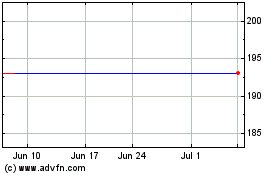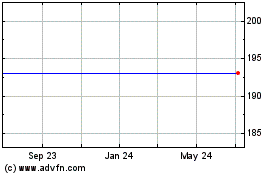By Jonathan D. Rockoff and Noemie Bisserbe
This article is being republished as part of our daily
reproduction of WSJ.com articles that also appeared in the U.S.
print edition of The Wall Street Journal (April 20, 2018).
Drugmaker Shire PLC has become the subject of topsy-turvy
takeover interest, drawing suitors to one of the few remaining
biotechs with rapidly rising sales and a stock price that hasn't
soared in recent months.
Japan's Takeda Pharmaceutical Co. kicked off the activity
Thursday by disclosing it made a GBP42.38 billion ($60 billion)
offer for Dublin-based Shire.
Shortly after Takeda revealed its interest, Shire said it had
rejected the offer. Then Allergan PLC jumped into the fray, saying
it was considering making its own bid for Shire -- only to pull
back hours later, after its stock plunged, to assert it wouldn't
make an offer after all.
The commotion was a reminder of the vital role that deal-making
plays for drug companies seeking a quicker boost to sales than
risky research and development can provide.
Shire is a leading seller of drugs for rare diseases, a $137
billion world-wide market that EvaluatePharma estimates is
increasing 11% a year, twice the pace of the overall
pharmaceuticals market.
Scientific advances uncovering molecular roots of rare
conditions have increased the odds of discovering treatments for
the diseases and heightened investor interest in the field. Health
regulators have approved drugs for rare diseases rapidly, citing
the needs of patients.
Takeda's bid could trigger rivals to join the fray, though Wall
Street's lukewarm reaction to the interest of Takeda and Allergan
could give other potential suitors pause, suggesting investor
support for big deals for established firms has its limits.
Allergan's shares fell more than 7% after the company announced
its interest in Shire and recovered after its about-face, and ended
the day down more than 4%. Takeda's stock swung throughout the day
and ended barely changed, down 0.06%. Shire ended up almost 6% in
heavy trading.
Shire itself illustrates the benefits and pitfalls of
deal-making. In five years at the helm, Chief Executive Flemming
Ornskov has used acquisitions to steer the company, once known for
its Adderall attention-deficit drug, toward treatments for rare
diseases like hereditary angioedema.
The shift has paid off: Shire reported $14.4 billion in product
sales last year, up 33% from the year earlier.
Shire's deal-fueled growth has made it a repeated takeover
target, despite Dr. Ornskov's efforts to build a large, independent
company. In 2014, the CEO fought a proposed acquisition by AbbVie
Inc. of North Chicago, Ill., until it relented and agreed to an
acquisition. The deal was called off after new U.S. tax rules
deterred U.S. companies from moving their tax homes overseas.
At the same time, Shire's acquisitions, especially a $32 billion
deal for hemophilia-drug maker Baxalta in 2016, left it saddled
with heavy debt and opened it to criticism from some analysts and
investors of overpaying for questionable assets.
Shire reported $19.1 billion in net debt at the end of 2017.
Some analysts and investors criticized the Baxalta deal because of
new competition in the hemophilia market and the looming threat of
a new kind of drug known as gene therapy.
The concerns weighed on Shire's share price, making the company
more attractive as a takeover target, analysts say.
Takeda has been undergoing its own deal-juiced transformation
under Chief Executive Christophe Weber, who has centralized the
company's sprawling operations and focused on drugs with the
biggest sales potential in areas like cancer, gastrointestinal
disorders and neuroscience.
Adding Shire would boost Takeda's sales to $30 billion a year,
and jump-start growth, but it would be a big bite to digest.
Takeda's market value of $38 billion Thursday in Tokyo, $13 billion
less than its London-listed target's.
Takeda would also face the same debt challenges its Irish rival
has been confronting. Takeda would likely have to take on
significant debt to fund a deal and balloon its net debt, which is
now at a manageable 1.8 times earnings before interest, taxes,
depreciation and amortization.
Takeda's offer included a mix of cash and stock. Shire
shareholders aren't likely to accept the large proportion of stock
Takeda is offering, preferring more cash, analysts said.
Such sentiment could leave room for other suitors, despite
Allergan backing away.
Through more than $100 billion in deals of its own, Allergan has
been made over into the seller of anti-wrinkle treatment Botox, as
well as medicines for gastrointestinal and neuroscience
disorders.
But Wall Street has pressured its shares, in part because of
concerns about generic competition looming for Restasis, one of its
best-selling products, and Allergan's controversial attempt to
protect the drug by selling its patents to an Indian tribe in New
York.
Allergan has been looking at a range of strategic options for
boosting its valuation, from divestitures to acquisitions to
combinations.
Dublin-based Allergan, required by Irish takeover rules to
reveal its M&A activities, said Thursday it was considering
making a bid for Shire. Both companies sell eye drugs, including
competing treatments for a condition known as dry eye.
Allergan wanted to give Shire a look as part of its strategic
review, but hadn't looked in-depth and was probably unlikely to
ever make a bid, according to a person familiar with the
matter.
The company issued a new statement later in the day, after its
shares plunged on the initial disclosure, saying it "does not
intend to make an offer for Shire."
Write to Jonathan D. Rockoff at Jonathan.Rockoff@wsj.com and
Noemie Bisserbe at noemie.bisserbe@wsj.com
(END) Dow Jones Newswires
April 20, 2018 02:47 ET (06:47 GMT)
Copyright (c) 2018 Dow Jones & Company, Inc.
Allergan (NYSE:AGN)
Historical Stock Chart
From Mar 2024 to Apr 2024

Allergan (NYSE:AGN)
Historical Stock Chart
From Apr 2023 to Apr 2024
